- Home
- James Joyce
A Portrait of the Artist as a Young Man Page 7
A Portrait of the Artist as a Young Man Read online
Page 7
He was sitting on the backless chair in his aunt's kitchen. A lamp with a reflector hung on the japanned wall of the fireplace and by its light his aunt was reading the evening paper that lay on her knees. She looked a long time at a smiling picture that was set in it and said musingly:
— The beautiful Mabel Hunter!
A ringletted girl stood on tiptoe to peer at the picture and said softly:
— What is she in, mud?
— In a pantomime, love.
The child leaned her ringletted head against her mother's sleeve, gazing on the picture, and murmured as if fascinated:
— The beautiful Mabel Hunter!
As if fascinated, her eyes rested long upon those demurely taunting eyes and she murmured devotedly:
— Isn't she an exquisite creature?
And the boy who came in from the street, stamping crookedly under his stone of coal, heard her words. He dropped his load promptly on the floor and hurried to her side to see. He mauled the edges of the paper with his reddened and blackened hands, shouldering her aside and complaining that he could not see.
He was sitting in the narrow breakfast room high up in the old dark-windowed house. The firelight flickered on the wall and beyond the window a spectral dusk was gathering upon the river. Before the fire an old woman was busy making tea and, as she bustled at the task, she told in a low voice of what the priest and the doctor had said. She told too of certain changes they had seen in her of late and of her odd ways and sayings. He sat listening to the words and following the ways of adventure that lay open in the coals, arches and vaults and winding galleries and jagged caverns.
Suddenly he became aware of something in the doorway. A skull appeared suspended in the gloom of the doorway. A feeble creature like a monkey was there, drawn thither by the sound of voices at the fire. A whining voice came from the door asking:
— Is that Josephine?
The old bustling woman answered cheerily from the fireplace:
— No, Ellen, it's Stephen.
— O... O, good evening, Stephen.
He answered the greeting and saw a silly smile break over the face in the doorway.
— Do you want anything, Ellen? asked the old woman at the fire.
But she did not answer the question and said:
— I thought it was Josephine. I thought you were Josephine, Stephen.
And, repeating this several times, she fell to laughing feebly.
He was sitting in the midst of a children's party at Harold's Cross. His silent watchful manner had grown upon him and he took little part in the games. The children, wearing the spoils of their crackers, danced and romped noisily and, though he tried to share their merriment, he felt himself a gloomy figure amid the gay cocked hats and sunbonnets.
But when he had sung his song and withdrawn into a snug corner of the room he began to taste the joy of his loneliness. The mirth, which in the beginning of the evening had seemed to him false and trivial, was like a soothing air to him, passing gaily by his senses, hiding from other eyes the feverish agitation of his blood while through the circling of the dancers and amid the music and laughter her glance travelled to his corner, flattering, taunting, searching, exciting his heart.
In the hall the children who had stayed latest were putting on their things: the party was over. She had thrown a shawl about her and, as they went together towards the tram, sprays of her fresh warm breath flew gaily above her cowled head and her shoes tapped blithely on the glassy road.
It was the last tram. The lank brown horses knew it and shook their bells to the clear night in admonition. The conductor talked with the driver, both nodding often in the green light of the lamp. On the empty seats of the tram were scattered a few coloured tickets. No sound of footsteps came up or down the road. No sound broke the peace of the night save when the lank brown horses rubbed their noses together and shook their bells.
They seemed to listen, he on the upper step and she on the lower. She came up to his step many times and went down to hers again between their phrases and once or twice stood close beside him for some moments on the upper step, forgetting to go down, and then went down. His heart danced upon her movements like a cork upon a tide. He heard what her eyes said to him from beneath their cowl and knew that in some dim past, whether in life or revery, he had heard their tale before. He saw her urge her vanities, her fine dress and sash and long black stockings, and knew that he had yielded to them a thousand times. Yet a voice within him spoke above the noise of his dancing heart, asking him would he take her gift to which he had only to stretch out his hand. And he remembered the day when he and Eileen had stood looking into the hotel grounds, watching the waiters running up a trail of bunting on the flagstaff and the fox terrier scampering to and fro on the sunny lawn and how, all of a sudden, she had broken out into a peal of laughter and had run down the sloping curve of the path. Now, as then, he stood listlessly in his place, seemingly a tranquil watcher of the scene before him.
— She too wants me to catch hold of her, he thought. That's why she came with me to the tram. I could easily catch hold Of her when she comes up to my step: nobody is looking. I could hold her and kiss her.
But he did neither: and, when he was sitting alone in the deserted tram, he tore his ticket into shreds and stared gloomily at the corrugated footboard.
*
The next day he sat at his table in the bare upper room for many hours. Before him lay a new pen, a new bottle of ink and a new emerald exercise. From force of habit he had written at the top of the first page the initial letters of the jesuit motto: A.M.D.G. On the first line of the page appeared the title of the verses he was trying to write: To E—C—. He knew it was right to begin so for he had seen similar titles in the collected poems of Lord Byron. When he had written this title and drawn an ornamental line underneath he fell into a daydream and began to draw diagrams on the cover of the book. He saw himself sitting at his table in Bray the morning after the discussion at the Christmas dinner table, trying to write a poem about Parnell on the back of one of his father's second moiety notices. But his brain had then refused to grapple with the theme and, desisting, he had covered the page with the names and addresses of certain of his classmates:
Roderick Kickham
John Lawton
Anthony MacSwiney
Simon Moonan
Now it seemed as if he would fail again but, by dint of brooding on the incident, he thought himself into confidence. During this process all those elements which he deemed common and insignificant fell out of the scene. There remained no trace of the tram itself nor of the tram-men nor of the horses: nor did he and she appear vividly. The verses told only of the night and the balmy breeze and the maiden lustre of the moon. Some undefined sorrow was hidden in the hearts of the protagonists as they stood in silence beneath the leafless trees and when the moment of farewell had come the kiss, which had been withheld by one, was given by both. After this the letters L.D.S. were written at the foot of the page, and, having hidden the book, he went into his mother's bedroom and gazed at his face for a long time in the mirror of her dressing-table.
But his long spell of leisure and liberty was drawing to its end. One evening his father came home full of news which kept his tongue busy all through dinner. Stephen had been awaiting his father's return for there had been mutton hash that day and he knew that his father would make him dip his bread in the gravy. But he did not relish the hash for the mention of Clongowes had coated his palate with a scum of disgust.
— I walked bang into him, said Mr Dedalus for the fourth time, just at the corner of the square.
— Then I suppose, said Mrs Dedalus, he will be able to arrange it. I mean about Belvedere.
— Of course he will, said Mr Dedalus. Don't I tell you he's provincial of the order now?
— I never liked the idea of sending him to the christian brothers myself, said Mrs Dedalus.
— Christian brothers be damned! said Mr Dedalus. Is i
t with Paddy Stink and Micky Mud? No, let him stick to the jesuits in God's name since he began with them. They'll be of service to him in after years. Those are the fellows that can get you a position.
— And they're a very rich order, aren't they, Simon?
— Rather. They live well, I tell you. You saw their table at Clongowes. Fed up, by God, like gamecocks.
Mr Dedalus pushed his plate over to Stephen and bade him finish what was on it.
— Now then, Stephen, he said, you must put your shoulder to the wheel, old chap. You've had a fine long holiday.
— O, I'm sure he'll work very hard now, said Mrs Dedalus, especially when he has Maurice with him.
— O, Holy Paul, I forgot about Maurice, said Mr Dedalus. Here, Maurice! Come here, you thick-headed ruffian! Do you know I'm going to send you to a college where they'll teach you to spell c.a.t. cat. And I'll buy you a nice little penny handkerchief to keep your nose dry. Won't that be grand fun?
Maurice grinned at his father and then at his brother.
Mr Dedalus screwed his glass into his eye and stared hard at both his sons. Stephen mumbled his bread without answering his father's gaze.
— By the bye, said Mr Dedalus at length, the rector, or provincial rather, was telling me that story about you and Father Dolan. You're an impudent thief, he said.
— O, he didn't, Simon!
— Not he! said Mr Dedalus. But he gave me a great account of the whole affair. We were chatting, you know, and one word borrowed another. And, by the way, who do you think he told me will get that job in the corporation? But I `Il tell you that after. Well, as I was saying, we were chatting away quite friendly and he asked me did our friend here wear glasses still, and then he told me the whole story.
— And was he annoyed, Simon?
— Annoyed? Not he! Manly little chap! he said.
Mr Dedalus imitated the mincing nasal tone of the provincial.
— Father Dolan and I, when I told them all at dinner about it, Father Dolan and I had a great laugh over it. You better mind yourself Father Dolan, said I, or young Dedalus will send you up for twice nine. We had a famous laugh together over it. Ha! Ha! Ha!
Mr Dedalus turned to his wife and interjected in his natural voice:
— Shows you the spirit in which they take the boys there. O, a jesuit for your life, for diplomacy!
He reassumed the provincial's voice and repeated:
— I told them all at dinner about it and Father Dolan and I and all of us we had a hearty laugh together over it. Ha! Ha! Ha!
*
The night of the Whitsuntide play had come and Stephen from the window of the dressing-room looked out on the small grass-plot across which lines of Chinese lanterns were stretched. He watched the visitors come down the steps from the house and pass into the theatre. Stewards in evening dress, old Belvedereans, loitered in groups about the entrance to the theatre and ushered in the visitors with Ceremony. Under the sudden glow of a lantern he could recognize the smiling face of a priest.
The Blessed Sacrament had been removed from the tabernacle and the first benches had been driven back so as to leave the dais of the altar and the space before it free. Against the walls stood companies of barbells and Indian clubs; the dumbbells were piled in one corner: and in the midst of countless hillocks of gymnasium shoes and sweaters and singlets in untidy brown parcels there stood the stout leather-jacketed vaulting horse waiting its turn to be carried up on the stage and set in the middle of the winning team at the end of the gymnastic display.
Stephen, though in deference to his reputation for essay writing he had been elected secretary to the gymnasium, had had no part in the first section of the programme but in the play which formed the second section he had the chief part, that of a farcical pedagogue. He had been cast for it on account of his stature and grave manners for he was now at the end of his second year at Belvedere and in number two.
A score of the younger boys in white knickers and singlets came pattering down from the stage, through the vestry and to the chapel. The vestry and chapel were peopled with eager masters and boys. The plump bald sergeant major was testing with his foot the springboard of the vaulting horse. The lean young man in a long overcoat, who was to give a special display of intricate club swinging, stood near watching with interest, his silver-coated clubs peeping out of his deep side-pockets. The hollow rattle of the wooden dumbbells was heard as another team made ready to go up on the stage: and in another moment the excited prefect was hustling the boys through the vestry like a flock of geese, flapping the wings of his soutane nervously and crying to the laggards to make haste. A little troop of Neapolitan peasants were practising their steps at the end of the chapel, some circling their arms above their heads, some swaying their baskets of paper violets and curtsying. In a dark corner of the chapel at the gospel side of the altar a stout old lady knelt amid her copious black skirts. When she stood up a pink-dressed figure, wearing a curly golden wig and an old-fashioned straw sunbonnet, with black pencilled eyebrows and cheeks delicately rouged and powdered, was discovered. A low murmur of curiosity ran round the chapel at the discovery of this girlish figure. One of the prefects, smiling and nodding his head, approached the dark corner and, having bowed to the stout old lady, said pleasantly:
— Is this a beautiful young lady or a doll that you have here, Mrs Tallon?
Then, bending down to peer at the smiling painted face under the leaf of the bonnet, he exclaimed:
— No! Upon my word I believe it's little Bertie Tallon after all!
Stephen at his post by the window heard the old lady and the priest laugh together and heard the boys' murmurs of admiration behind him as they passed forward to see the little boy who had to dance the sunbonnet dance by himself. A movement of impatience escaped him. He let the edge of the blind fall and, stepping down from the bench on which he had been standing, walked out of the chapel.
He passed out of the schoolhouse and halted under the shed that flanked the garden. From the theatre opposite came the muffled noise of the audience and sudden brazen clashes of the soldiers' band. The light spread upwards from the glass roof making the theatre seem a festive ark, anchored among the hulks of houses, her frail cables of lanterns looping her to her moorings. A side door of the theatre opened suddenly and a shaft of light flew across the grass plots. A sudden burst of music issued from the ark, the prelude of a waltz: and when the side door closed again the listener could hear the faint rhythm of the music. The sentiment of the opening bars, their languor and supple movement, evoked the incommunicable emotion which had been the cause of all his day's unrest and of his impatient movement of a moment before. His unrest issued from him like a wave of sound: and on the tide of flowing music the ark was journeying, trailing her cables of lanterns in her wake. Then a noise like dwarf artillery broke the movement. It was the clapping that greeted the entry of the dumbbell team on the stage.
At the far end of the shed near the street a speck of pink light showed in the darkness and as he walked towards it he became aware of a faint aromatic odour. Two boys were standing in the shelter of a doorway, smoking, and before he reached them he had recognised Heron by his voice.
— Here comes the noble Dedalus! cried a high throaty voice. Welcome to our trusty friend!
This welcome ended in a soft peal of mirthless laughter as Heron salaamed and then began to poke the ground with his cane.
— Here I am, said Stephen, halting and glancing from Heron to his friend.
The latter was a stranger to him but in the darkness, by the aid of the glowing cigarette tips, he could make out a pale dandyish face over which a smile was travelling slowly, a tall overcoated figure and a hard hat. Heron did not trouble himself about an introduction but said instead:
— I was just telling my friend Wallis what a lark it would be tonight if you took off the rector in the part of the schoolmaster. It would be a ripping good joke.
Heron made a poor attempt to imitate for his fri
end Wallis the rector's pedantic bass and then, laughing at his failure, asked Stephen to do it.
— Go on, Dedalus, he urged, you can take him off rippingly. He that will not hear the churcha let him be to theea as the heathena and the publicana.
The imitation was prevented by a mild expression of anger from Wallis in whose mouthpiece the cigarette had become too tightly wedged.
— Damn this blankety blank holder, he said, taking it from his mouth and smiling and frowning upon it tolerantly. It's always getting stuck like that. Do you use a holder?
— I don't smoke, answered Stephen.
— No, said Heron, Dedalus is a model youth. He doesn't smoke and he doesn't go to bazaars and he doesn't flirt and he doesn't damn anything or damn all.
Stephen shook his head and smiled in his rival's flushed and mobile face, beaked like a bird's. He had often thought it strange that Vincent Heron had a bird's face as well as a bird's name. A shock of pale hair lay on the forehead like a ruffled crest: the forehead was narrow and bony and a thin hooked nose stood out between the close-set prominent eyes which were light and inexpressive. The rivals were school friends. They sat together in class, knelt together in the chapel, talked together after beads over their lunches. As the fellows in number one were undistinguished dullards, Stephen and Heron had been during the year the virtual heads of the school. It was they who went up to the rector together to ask for a free day or to get a fellow off.
— O by the way, said Heron suddenly, I saw your governor going in.
The smile waned on Stephen's face. Any allusion made to his father by a fellow or by a master put his calm to rout in a moment. He waited in timorous silence to hear what Heron might say next. Heron, however, nudged him expressively with his elbow and said:

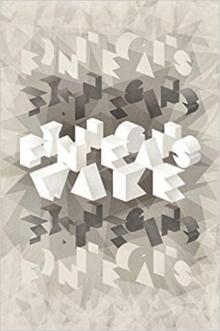 Penguin Classics the Restored Finnegans Wake
Penguin Classics the Restored Finnegans Wake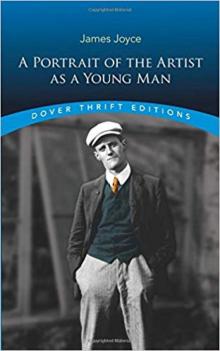 A Portrait of the Artist as a Young Man (Dover Thrift Editions)
A Portrait of the Artist as a Young Man (Dover Thrift Editions)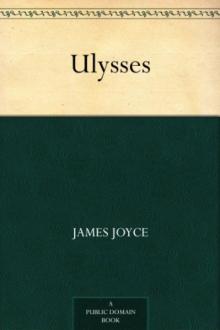 Ulysses
Ulysses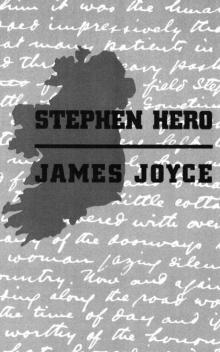 Stephen Hero
Stephen Hero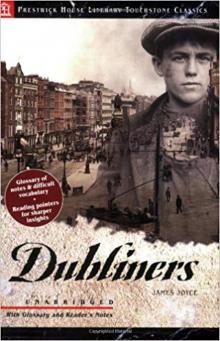 Dubliners
Dubliners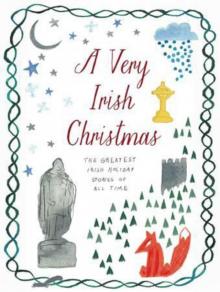 A Very Irish Christmas
A Very Irish Christmas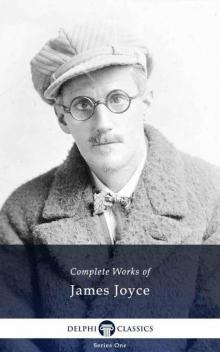 The Complete Works of JAMES JOYCE
The Complete Works of JAMES JOYCE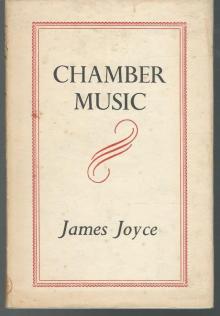 Chamber Music
Chamber Music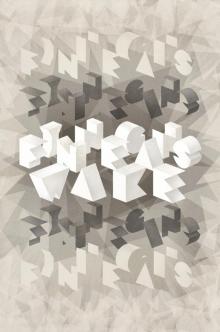 The Restored Finnegans Wake
The Restored Finnegans Wake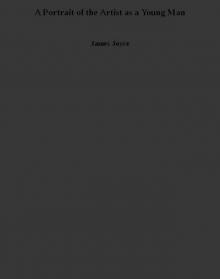 A Portrait of the Artist as a Young Man
A Portrait of the Artist as a Young Man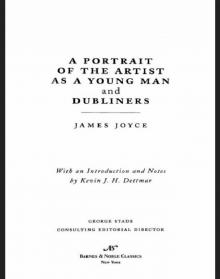 Portrait of the Artist as a Young Man and Dubliners (Barnes & Noble Classics Series)
Portrait of the Artist as a Young Man and Dubliners (Barnes & Noble Classics Series)